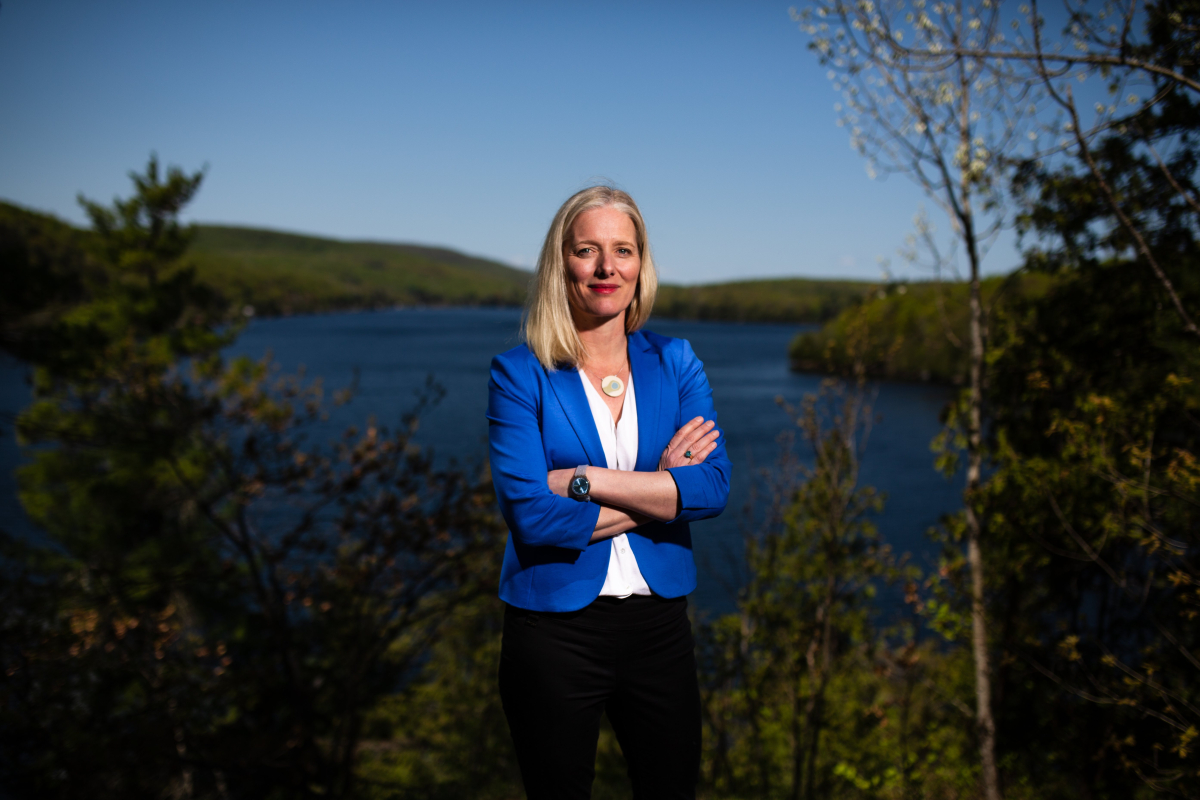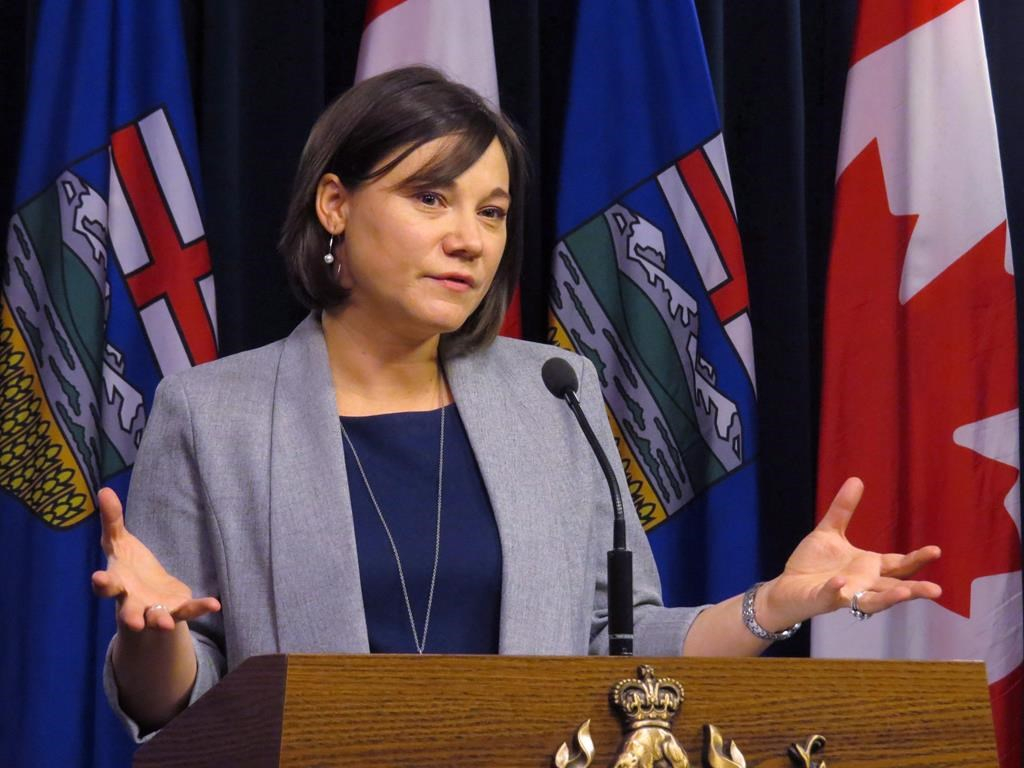Thank you for helping us meet our fundraising goal!
Alberta's environment minister says there is a steadfast, "non-factual, vicious form" of climate denial among those on the right of the political spectrum.
But she insists that most Albertans are "progressive folks" who share the government's view that climate change is real and action is warranted.
Shannon Phillips made the comments at a summit near Ottawa last week on women climate leaders, after National Observer asked the minister how her government plans to deal with recent surveys showing some public skepticism over the threat of climate change and the benefits of putting a price on carbon pollution.
A spokesperson for Alberta’s opposition United Conservative Party leader Jason Kenney reacted to her statement by pointing to his earlier dismissal of criticism by federal Environment and Climate Change Minister Catherine McKenna. "Yes, I'm a carbon tax denier but I'm not a climate change denier," he had said.
An online survey for Canada’s Ecofiscal Commission by Abacus Data, published in April, found less than two thirds of Canadians believe the overwhelming global scientific consensus that climate change is occurring now. Alberta residents are the least likely to believe the planet is warming, according to the survey.
Such online surveys are not necessarily representative of the general public, according to polling industry standards. Online surveys are not random and have no margin of error.
The scientific consensus, assessed by the United Nations Intergovernmental Panel on Climate Change, is that all the warming since 1950 has been caused by humans, primarily through burning fossil fuels that release climate-warming greenhouse gases.
As well, a CBC Road Ahead Survey by Trend Research published on May 4 found two-thirds of Albertans surveyed want to get rid of the Alberta NDP’s carbon tax.
Most economists say carbon pricing is needed to correct a market failure where fossil fuels were not priced according to the costs they impose on people. Insurance claims over the past decade have tripled compared to decades past, as climate change exacerbates the severity of natural disasters like floods and wildfires. By 2050, climate change is expected to cost as much as $43 billion a year.
“There is no question that the Canadian right — and there is no question, in some of its more non-factual, vicious forms that it takes, in Alberta in particular — there is no question that there remains a steadfast belief that climate change is not real,” said Phillips.
“We do not share that view, and in fact the majority of Albertans don’t share that view. The majority of Albertans are progressive folks who want to see our province move forward, and you cannot govern by looking in the rear-view mirror,” she added.
“Climate change is real, and the question then becomes, what are you going to do about it? Because if the answer is nothing, then you actually don’t accept that climate change is real.”

Questioning humanity's climate contribution
British Columbia’s carbon tax, in place for a decade, led to a drop in emissions of between five and 15 per cent even while provincial economic growth outpaced national numbers, according to the Ecofiscal paper.
But Alberta Premier Rachel Notley has faced relentless personal attacks in part over her government's decision to implement an economy-wide carbon tax in her province. At an anti-carbon tax rally hosted by right-wing Rebel Media group in 2016, the crowd chanted "lock her up" in reference to Notley.
Last fall, Canada’s independent competition watchdog abruptly dropped an inquiry into climate deniers. This probe was triggered in response to a complaint about a billboard in Calgary, Alta. in 2014 that questioned humanity's contribution to climate change.
Kenney has questioned “exactly to what degree” humans are responsible for climate change. On May 7, he defended that statement in front of a federal Parliamentary committee, saying he agreed the human influence was “very significant” but repeated there was “a debate of the precise degree.”
Kenney has also rejected the Trudeau government’s Greenhouse Gas Pollution Pricing Act and has said he will join a Saskatchewan court reference challenging such a federal tax. He has also vowed to scrap the Alberta NDP’s carbon pricing regime.
Responding to criticism by McKenna, Kenney told CTV: "That's classic of (McKenna) and the Trudeau government, the arrogance, the dismissiveness.
"Anybody who doesn't agree, in her case with a punitive carbon tax, gets called a name, and with this highly charged politicized language... yes, I'm a carbon tax denier but I'm not a climate change denier."
The Alberta government is spending $600,000 to provide scientific climate information to schools and community groups, a move Phillips has likened to sending kids home with anti-smoking material.
Phillips said Albertans embraced the tax after considering their international reputation. The province has the third biggest proven reserve of oil after Saudi Arabia and Venezuela, but oilsands extraction is costly and energy-intensive.
She said it was developed in consultation with the energy industry and has been championed by industry players. The province has paired it with a small business tax cut and low-income rebates.
“As a result, we’re now into year two of an economy-wide price on carbon, Alberta continues to lead the country in economic growth, both in the traditional energy sector and now we’re seeing tremendous growth in clean tech, energy efficiency and renewables,” said Phillips.
“We, of course, had the lowest priced renewable procurement in Canadian history recently, and we have more to come on that file," she added, referring to the results of the province's first round of its Renewable Electricity Program in December, a 20-year average price of 3.7 cents per kilowatt-hour.

'The goal is not to make money'
McKenna hosted the climate summit where Phillips spoke. Asked her view of the public surveys on climate change and carbon pricing, McKenna emphasized how pricing creates an incentive to save money by becoming more energy efficient.
"It also creates incentives for new technologies — and I”ve seen these technologies across the country. Net-zero homes, electric vehicles, or small solutions like insulating your home. These all save money and it creates the incentive to do that," said McKenna.
Four-fifths of Canadians live in a province where there is already a price on pollution, she noted. B.C. and Alberta have carbon taxes, while Ontario and Quebec have a cap and trade systems. The proposed federal system would provide a minimum standard and allow for provincial plans that meet or exceed this standard, such as those four provinces.
The Trudeau government has said for those provinces where a federal minimum standard will be imposed, all revenues will be returned to that province, and potentially directly to individuals.
"The goal is not to make money, the goal of putting a price on pollution is to take action to reduce emissions, to create innovation, to create good jobs," said McKenna.






Comments
This is totally bizarre. The Alberta NDP government might say that climate change is real but they are the ones desperate to pump more and more carbon into the atmosphere. They defend the tarsands which is one of the world's worst sources of carbon release and they want to ship the bitumen overseas to be burned elsewhere. Their nice words are just hypocrisy. James Hansen said "Talking nice about sun and wind and green jobs is just greenwash." So true of Notley and her minister.
It seems to me that Notley agreed to a carbon tax in exchange for Trudeau promising to agree to backing the Kinder Morgan pipeline. I am open to being persuaded that " Albertans embraced the tax after considering their international reputation", but all I have read about suggests that Albertans want to scrap the tax at the first opportunity.
Disingenuous in the extreme.
AB Environment Minister Shannon Phillips is condemned by her own words.
Oilsands expansion is incompatible with Canada's climate targets — and Phillips knows it.
The contradiction is obvious to six-year-olds.
Here in Alberta "climate leadership" means using a carbon tax as a fig leaf to build pipelines, setting no targets or timelines, boosting GHG emissions, holding hands with Big Oil CEOs, throwing billions of dollars in subsidies at the fossil fuel industry, and preventing Canada from meeting its targets.
AB's climate plan is a fig leaf to buy "social licence" for pipeline approvals.
AB's climate change plan is the only one in the world to boost emissions by design.
Oilsands expansion will boost AB's emissions for decades.
No science supports Notley's plan.
Several studies indicate that the oil & gas industry's emissions are grossly under-reported. A problem the AB Govt is unlikely to fix any time soon.
The UN, the Organization for Economic Co-operation and Development (OECD), and the federal Environment Commissioner all issued warnings in 2017 that Canada is not on track to meet its targets. Oilsands emissions are the major obstacle.
OECD: "Without a drastic decrease in the emissions intensity of the oilsands industry, the projected increase in oil production may seriously risk the achievement of Canada's climate mitigation targets."
AB's tiny carbon tax (now 7 cents on a litre of gas) does nothing to change consumer behavior.
The 100+ Mt oilsands cap is 43% above current (under-reported) levels. Exemptions push the cap even higher.
The cap will not outlive the NDP Govt. It's one of the top items on Jason Kenney's hitlist.
On pipelines, oilsands expansion, boosting AB's emissions, and ignoring science, Notley and Kenney are Tweedledum and Tweedledee.
A pox on both their houses.
In Australia, in the three and a half years since the carbon price was removed, total greenhouse gas emissions have grown on average by 1.3% each year, compared with an average annual fall of 1.1% during the carbon price period.
(source: The Guardian, May 14, 2018: "It's No Surprise Emissions Keep Going Up, There's No Price on Carbon")
In British Columbia, the previous government capped the carbon tax at $30/tonne for many years. The result is that BC's greenhouse gas emissions are going up again. The latest figures, for the year 2015, estimate BC's carbon emissions at 63.3 Mt CO2 eq, an increase of 1.6% over the previous year.
(source: Vancouver Sun, Jan 12, 2018: " Latest Figures Show BC's Carbon Emissions Continue to Increase")
In contrast, Sweden introduced a carbon tax in 1991. At the time, the price was EUR29 per ton, and it has since risen to today's price of EUR137 per ton, the highest carbon tax rate in the world. During that period, Sweden's GDP rose by 60% and GHG emissions were reduced by 25%. As the Swedish Minister of Finance Magdalena Anderson said: " So, putting a price on carbon is not only the morally thing to do, it's also economically smart politics."
(source: The World Bank, May 16, 2016: "When It Comes To Emissions, Sweden Has Its Cake and Eats It Too")
Jason should give a call to the Swedish Finance Minister.
We should all be hoping for US tariffs on Canadian autos. If a few million less cars are exported to the US that should greatly reduce CO2 emissions and save the planet.
I have wondered who is paying for the thousands of commercials and other advertising we see about the oil sands being so good for our clean and pristine Canada?